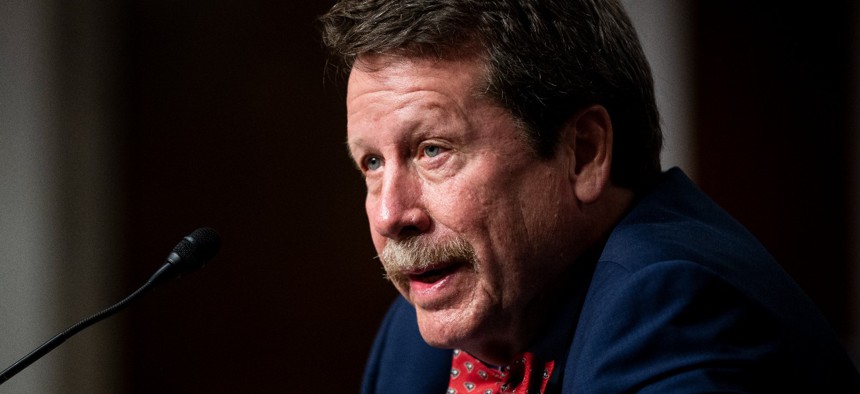
Dr. Robert Califf testifies on Capitol Hill on December 14, 2021. Bill Clark/CQ-Roll Call, Inc via Getty Images
The FDA Finally Has a Permanent Leader, After More Than a Year
The Senate voted 50-46 to confirm Dr. Robert Califf.
The Senate voted 50-46 on Tuesday—with one additional senator voting “present”—to confirm President Biden’s nominee to lead the Food and Drug Administration, a key agency in the federal response to the COVID-19 pandemic.
Biden tapped Dr. Robert Califf, most recently a professor of medicine at the Duke University School of Medicine who previously served as FDA commissioner from 2016 to 2017, in November. Since then, Califf has drawn criticism from some senators about his ties to the pharmaceutical industry.
Key senators argued on the Senate floor, however, that Califf is the right person for the job and that the FDA would benefit from having a permanent leader in place. “At this critical moment we need a trusted hand to lead the FDA and Dr. Califf’s previous service in this role [and] his career as one of nation’s leading research scientists give him the experience to take on this challenge,” said Sen. Patty Murray, D-Wash., chairwoman of the Senate Health, Education, Labor and Pensions Committee, on Monday night. Califf was confirmed 89-4 in 2016.
In addition to pandemic-related matters, such as the process to greenlight vaccines for kids under five (which was put on hold on Friday), “there are countless other ways FDA works that matter to families,” Murray said.
Sen. Richard Burr, R-N.C., ranking member of the Senate Health, Education, Labor and Pensions Committee, also supported the nominee, noting on the floor on Tuesday, “it’s been 391 days since the FDA has had a Senate-confirmed commissioner.” No matter the success and efficiency of an acting commissioner, “the full backing of a presidential nomination and confirmation by the United States’ Senate carries a weight that allows a confirmed commissioner to push forward necessary, meaningful change and leadership within a federal agency,” he said.
Meanwhile, Sen. Joe Manchin, D-W.Va., who voted against the nomination, said on Monday, “my opposition is nothing new,” as he opposed Califf in 2016 as well. “Despite his pledge to overhaul the FDA’s policy during his tenure and immediately following it, the FDA approved five new opiates for market. In that same time period they removed only one,” Manchin said. “Nothing that Dr. Califf has said or done has led me to believe he will operate the FDA any differently than he did during his previous tenure.”
The confirmation vote came after the Senate voted 49-45 on Monday night to invoke cloture on the nomination, compared to 80-6 in 2016.
During a hearing in December, Califf testified that if confirmed, he will prioritize workforce retention and rebuilding trust in the agency.
White House Principal Deputy Press Secretary Karine Jean-Pierre said during the briefing on Monday the White House was confident that Califf would be confirmed with bipartisan support. “It is critically important to have confirmed leadership at the FDA in the midst of a pandemic, as we all know,” she said.
There has been concern for a while that the Biden administration does not have a confirmed leader for the FDA. Both President Trump and Obama’s first FDA commissioners were confirmed in May of their first years in office.
Six former FDA commissioners, who served under Democratic and Republican administrations, sent a letter to the Senate Health, Education, Labor and Pensions Committee in December supporting Califf’s confirmation.
“The agency has a dedicated and talented professional staff that has been working intensely on COVID-19 response efforts, and acting Commissioner Dr. Janet Woodcock has provided invaluable, experienced leadership throughout our public health emergency,” they wrote. “But the absence of a confirmed commissioner complicates the agency’s ability to undertake and sustain the leadership needed now to protect and promote the health of all Americans.”







